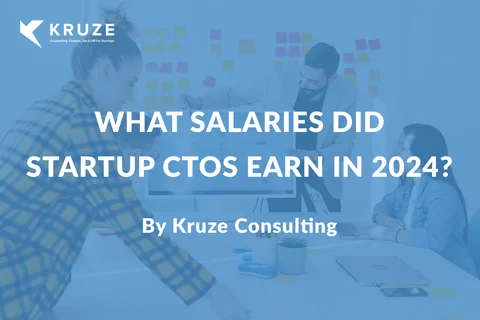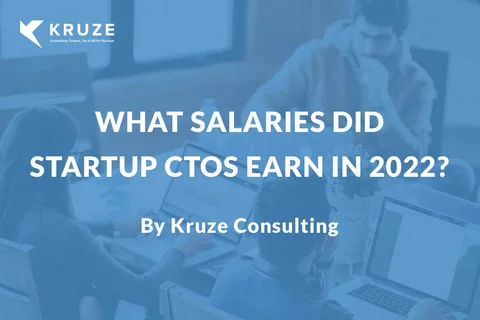
Startup founders ask us what salaries they should pay their CTOs and other team members. As the leading CPA serving VC-backed startups, we’ve got the data! We first published startup CTO data in 2022, and waited until 2024 to update it. You can also see our other salaries guides - our founder salary guide and our startup CEO salary guide.
We use the same methodology for all of these reports - payroll data. This isn’t a survey or a gut feeling from some recruiter or VC, this is actual, anonymized data from payroll systems, so you can trust it’s accuracy. Kruze’s clients have collectively raised billions of dollars in VC funding, and are backed by the leading venture capital funds. All of these clients are US based, and our 2024 CTO salary data comes from over 250 VC-backed startups that have collectively raised over $1.5 billion dollars.
Note: the salaries we are about to present will seem low - read to the end to see how founders vs. non-founders salaries compare; then the low compensation will make more sense!
Startup CTO Salary - Table of Contents
Average Startup CTO Salary in 2024
In 2024, based on the anonymized payroll data of over 250 startups, the average startup CTO salary was $157,000 and the median was $150,000. CTO pay varies by several key variables that we can analyze - stage of the company, the industry that the company is in, and if the CTO is a founder or not.
Compared to the CEOs of startups, CTOs make more cash compensation. We don’t consider this surprising, since finding technical talent is a challenge and qualified technical team members are in high demand. Compare the average and median salaries of CEOs vs CTOs:
| CEO | CTO | |
|---|---|---|
| Average salary | $141,000 | $157,000 |
| Median salary | $147,000 | $150,000 |
It may seem strange that the CEO salary median is higher than the average, whereas for the chief technical officers, the median is lower than the average. We talk some on our CEO salary report about why the CEO’s median is higher - mainly there are a number of startups where the CEO & founder takes a low to zero salary to cut the company’s burn rate and push out their runway, and this decreases the average more than the median. However, while some CTO founders in our dataset have also cut their salary to a low number, this position is much more likely to not be a founder. And it’s very hard to retain talent at a below market (or zero!) salary, so we don’t find any non-founder CTOs getting paid zero dollars. Therefore, the average salary for this role is higher than the media.
Startup CTO Salary by Stage
In general, chief technical officers make a higher salary as the company becomes later stage. This is because the CTO’s responsibilities increase as the company grows, because the company has more funding and because it becomes more “derisked” as it raises subsequent funding rounds.
Average CTO Salaries by Funding Stage vs CEOs
| CEO | CTO | |
|---|---|---|
| Seed | $132,000 | $146,000 |
| Series A | $179,000 | $223,000 |
| Series B | $227,000 | $245,000 |
Once again, CEOs make less than the technical leaders inside of their organizations. We should note that chief executive pay is depressed at the Series B in 2024 due to the tough fundraising environment. It’s particularly difficult for Series B companies to raise funding in 2024, for several reasons. First of all, many Series B stage companies raised capital two or more years ago at very high valuations. Now that valuation multiples have dropped, many Series B founders are doing everything they can to stretch out their runway and avoid having to fundraise again in a downround, so many have reduced their pay. Additionally, the metrics that VCs are looking for at the Series B have gotten pretty high, so it’s harder for companies to have what they need to actually get a round done - again, founders are cutting their pay to try to keep their companies in business.
Founding CTO Pay vs. Non-Founders
Some first time founders don’t quite understand this dynamic - non-founder executives tend to be paid higher cash compensation than founders in the same role. This is for a few reasons, the biggest of which is that a founder, say a founding CTO, would have a large slug of founder’s shares in the business - a high equity upside. While hired executives also get stock compensation, they don’t have the same percentage ownership as founders, and need to be paid a higher cash amount to be convinced to join the business.
In our dataset, founding CTOs make $139,000 whereas non-founding CTOs make $213,000. A pretty serious premium in cash compensation! Narrowing down by stage, seed stage founders in this role make an average of $133,000 whereas non-founders make $190,000 - a massive premium. At the Series A, there is a similarly huge spread. Founders: $177,000 and non-founders: $293,000. That’s a big jump in over $115,000 per year in salary. Once again, finding CTOs is hard!

Kruze Consulting works with a wide range of funded startups, and we’re frequently asked about salary ranges for early-stage companies, including chief technology officers (CTOs). We produce an annual report on startup CEO salaries, and this year we’re adding CTO pay to our analysis. We’ve reviewed salary data from over 200 seed and venture-funded startups to determine the average annual paycheck earned by chief technology officers. We’ve also positioned them against average CEO salaries to provide a more comprehensive picture of startup salaries.
CTO salaries increase by funding stage
It’s to be expected that salaries increase as a startup accumulates more capital, and our research confirms that. A somewhat non-intuitive datapoint also emerged – CTO paychecks on average are larger than those of CEOs in the seed stage.
Average CTO and CEO salaries by funding stage:
| CTO | CEO | |
|---|---|---|
| Seed | $142,000 | $130,000 |
| Series A | $174,000 | $187,000 |
| Series B | $250,000 | $260,000 |
This suggests that CTOs are in demand and startups need to pay more, at least initially, to attract top talent. Highly technical engineers and engineering leaders have many career opportunities. Generally speaking, the best engineers can get high salaries elsewhere – with entry level positions at top tech companies like Google and Facebook paying $150,000 a year or more, and highly-experienced professionals making several times that.
Startups need to compete against these high salaries and equity compensation. So higher salaries are warranted for technology officers at the seed stage to offset the potential opportunity cost of working for a new company with no track record, as opposed to a position with an established business, even if founding and early-stage technical leads receive high equity compensation.
Successfully raising subsequent funding rounds indicates that the company is hitting its milestones and achieving its goals. At that point the CEO’s compensation begins to increase and exceeds the CTO’s salary.
Seed-stage CTO pay varies by industry
Technology officers’ salaries differ significantly by industry. Reasons for the variation may include the specific technical, experience, and educational requirements for that particular industry.
Average CTO salaries by industry (seed only):
| Seed Pay | CTO | CEO |
|---|---|---|
| Software / SaaS | $141,000 | $123,000 |
| Healthcare | $150,000 | $110,000 |
| Hardware | $118,000 | $112,000 |
| eCommerce | $138,000 | $141,000 |
Healthcare, a highly regulated industry, offers the highest average startup compensation for chief technology officers, which probably reflects the experience necessary to navigate the legal and regulatory requirements for that sector, as well as the technical knowledge required. It is also possible that healthcare requires a higher salary vs. a more traditional “software/hardware” company that may organically appeal to more technical founders. Other industries with significant technology requirements like software/SaaS and eCommerce also pay technology officers more on average.
On average, startup CTO salaries are roughly comparable to Chief Executive Officer salaries
The majority of technology and engineering officers earn the same salaries as CEOs. This may reflect the fact that many CTOs are co-founders, and therefore earn similar salaries to the CEOs.
CTO salaries as percent of CEO Salaries:
One piece of evidence that supports this conclusion is that non-founding CTOs make ~$50k to $60k more than founding CTOs at the seed and Series A stages - this gap shrinks to $35k at Series B. The decrease in the pay gap is likely due to 1) the CEO’s pay increasing to the point where it’s closer to market for a highly-compensated engineer; and 2) decreasing risk of the company’s failure at the later stage means that a non-founder joining takes on lower theoretical risk vs. joining a big company. Non-founding chief technology officers have a smaller equity stake in the startup, and would be more likely to negotiate for a salary closer to market levels.
What does a startup CTO do?
Startup chief technology officers are typically much more hands-on than their counterparts in an established large company. Both participate in strategic decisions and company direction, but startup technology and engineering directors have to be willing to get their hands dirty, getting involved in routine work, and taking on different tasks to fill in gaps in their teams. A startup CTO leverages technology to help build the product, and supervises the engineering team and any outsourced or freelance development staff. But the daily duties of a technology leader can differ widely based on the business itself and the stage of the startup.
While the responsibilities of individual CTOs vary, common traits include:
- Knowledge of technologies. A technology leader needs to identify both existing and emerging technology that is a good fit for the startup.
- Background in development. CTOs usually have a good grasp of software development, programming, and system architecture, to help them lead other developers and handle the startup’s technical challenges.
- Managerial experience. While technology executives often pitch in with work in the company’s early stages, as the startup grows, the CTO will shift to a more managerial role. A strong network is important in this role, to help identify, attract, and hire to fill certain roles. The technology leader also needs to evaluate performance and take action if necessary.
- Project management skills. The product development process is complex and multi-layered. A startup technology director needs to manage multiple projects, be highly organized, and communicate effectively with the development team, management, investors, and other stakeholders.
- Ability to encourage positive work environments. Talented developers and engineers can be difficult to find and often are regularly headhunted. A technology and engineering leader needs to promote a positive and rewarding work experience to encourage developers to both stay with the startup and produce their best work.
Experience with startups is a plus
Being a startup CTO is very different than the same position in a more corporate setting with an established company. Startups are less bureaucratic, faster-paced, and more dynamic than large corporations, and having experience with the startup environment is a big asset for an early-stage CTO.








